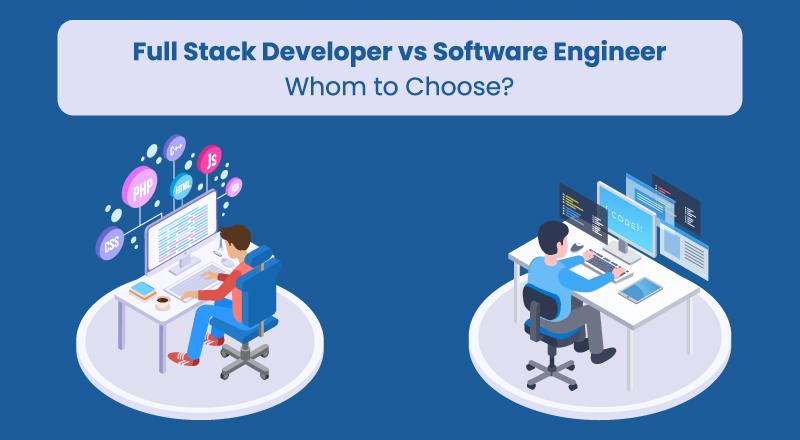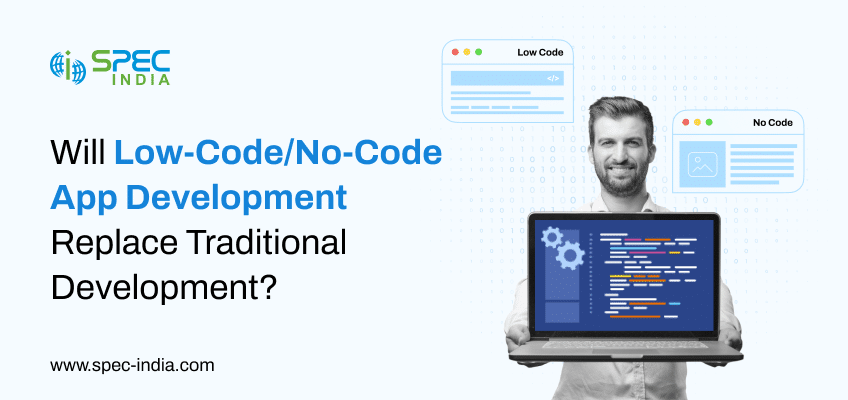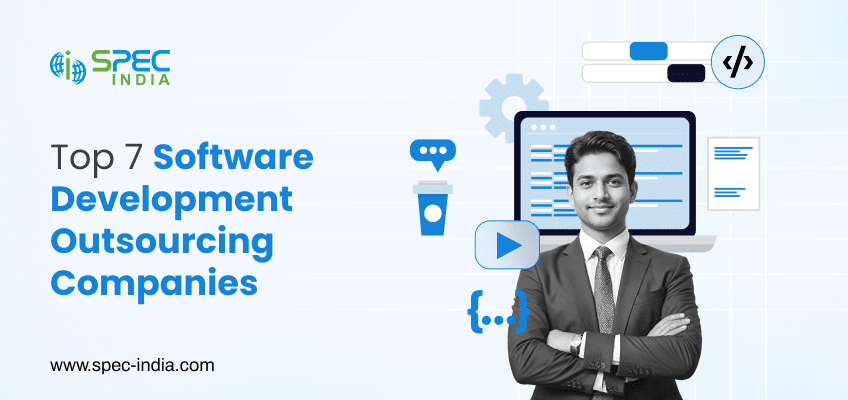Full Stack Developer vs Software Engineer: Whom to Choose?

The world of software development is vast. Among the multiple roles that are defined here, two popular roles that are often compared are Full-Stack Developer and Software Engineer.
It isn’t easy to understand the difference between them. Both these roles can be found simultaneously in any organization or can be chosen based on requirements.
As we evaluate the characteristics of software engineers vs. full-stack developers, specific areas where their roles overlap, and certain places where there is a distinction, the scope for full-stack and custom software development increases significantly.
Overall, we see a set of similarities and differences that exist. Each specializes in software development and needs different skills to fulfill their responsibilities.
As we observe the soaring demand for both roles, it is highly significant to understand the individual characteristics of full-stack developers and software engineers since both are assets to technical teams.
This article focuses on understanding roles separately and observing the difference between software engineers and full-stack developers.
Through this read, we will cover the following areas:
- Full Stack Developer vs. Software Engineer
- Job description
- Roles and responsibilities
- Key skills
- Salary
- Similarity and difference between Full Stack Developer and Software Engineer
So, let us get started.
Full Stack Developer Job Description
A full-stack developer is a technical expert who easily manages the front end and the back end. They are adept at designing and creating websites and apps, dealing with clients, and working on databases, servers, frameworks, APIs, libraries, etc.
They are well-versed in multiple programming languages, frontend frameworks, and backend databases.
They have extensive knowledge and offer comprehensive system engineering services that consist of mobile, web, and native application technology stacks.
Since they are proficient in front and back, they can even monitor projects with responsibility and track their progress for timely completion.
Full-stack developers deeply understand all parts of the web, websites, and mobile applications and how systems work in sync.
They work on server configuration, database development and implementation, client coding, and QA testing. They also build compelling user interfaces that can assist in data input and output.
Software Engineer Job Description
Software engineers are technology experts with detailed knowledge of programming languages, OSs, and software development practices.
They are keen to harness their engineering fundamentals to offer tailor-made software solutions for organizations.
A software engineer can build native applications for different platforms, such as mobile devices, desktops, consoles, TV sets, etc., using languages like Java, C++, Swift, etc.
They apply mathematical analysis and the fundamentals of computer science to create a variety of software elements.
They select practical algorithms for solving issues based on parameters like memory space, processing power, and OS compatibility. They work in sync with other members, such as programmers, designers, and analysts.
They undergo detailed planning of their projects with intensive knowledge about their project.
Full Stack Developer vs Software Engineer: Roles and Responsibilities
Full Stack Developer Responsibilities
- Creation of websites, programs, databases, and online content
- Maintenance of applications and codebase
- Testing and fixing bugs for better functioning
- Collaboration with management for project timelines
- Creation of APIs and interfaces for two-way communication
- Cross-platform accordance for different devices and browsers
- Client consultation
- Creating software prototypes
- Becoming a leader for product teams
- Writing of code for frontend and backend work
- Performance monitoring of applications
- Assisting team members in task completion
- Developing APIs and RESTful protocols
Software Engineer Responsibilities
- Creation of software documentation
- Testing and creating programs to ensure quality
- I am performing all types of testing – unit, integration, system, acceptance, etc.
- Informing management and teams on project status
- Identifying risks and suggesting changes
- Management of software development life cycles
- Monitoring system performance
- In-depth data analysis for the enhancement of systems
- Creation of project plans and schedules
- Establishes new solutions to assist businesses
- Communication of project status with departments and clients
- Finding out areas of improvement and further lines of action
Full Stack Developer vs Software Engineer: Key Skills Involved
The two roles must exhibit distinct skill sets and requirements even if they are in the same industry segment. Some of them are common, while others stand apart. Here are they:
Complete Stack Developer Skills:
- Detailed knowledge of programming languages like HTML, CSS, JavaScript, Python, PHP, jQuery, etc.
- Management of frontend and backend tasks
- Databases like MySQL, NoSQL, PostgreSQL, etc.
- Managing the security of databases
- Core application development
- Understanding of web architecture and code structuring
- Leadership, project management, task management, client communication
- Time management, creative thinking skills, analytical thinking
- Modernized development methods like DevOps, Agile, CI/CD, etc.
Software Engineer Skills:
- Working knowledge of programming languages like Java, C++, Python, Ruby, etc.
- Object Oriented Design principles
- Debugging and issue resolution
- Different Testing methods like unit testing, integration testing, etc.
- Accessible communication with team members
- Computer and database architecture, data structures
- Visual and web designing
- Time management, analytical thinking
- Communication and interpersonal skills
Full Stack Developer vs Software Engineer: The Salary Details
Full Stack Developer Salary:
According to Glassdoor, the national average salary for a full-stack developer is $98,026 in the United States
According to Indeed.com, the average salary for a full-stack developer is £56,784 per year in the United Kingdom
According to talent.com, the average full-stack developer salary in Australia is $120,000 per year
According to Indeed.com, the average salary for a full-stack developer is $115,115 per year in New Zealand
Salary of Software Engineer:
According to Glassdoor, the national average salary for a software engineer is $90,824 in the United States
According to Indeed.com, the average salary for a software engineer is £50,392 per year in the United Kingdom
According to talent.com, the average software engineer salary in Australia is $119,974 per year
According to Glassdoor, the average salary for a software engineer is $98,000 per year in New Zealand
Before we plunge into the difference between Full Stack Developers and Software Engineers, let us go through the similarities they possess:
The Similarities:
- Focus on achieving client and project goals
- Work as a part of a team to design, develop, and test software
- Collaborate with data scientists, programmers, data analysts
- Build testing environments to simulate real-world conditions
- Understanding of modern approaches like DevOps, Agile, Scrum, etc.
- Hands-on programming experience with popular languages
Full Stack Developer vs Software Engineer: An Interesting Evaluation
| Parameters |
Full Stack Developer |
Software Engineer |
| Functions |
Experts in all steps of app development. Can work on any part of the application. They look at server-side and client-side development, creating faster prototypes with a holistic approach.
They can develop databases, construct APIs, and design websites. The web applications they create can have multiple functionalities. |
Create applications that execute on a desktop. Can work on specific parts of the application. They undertake coding, testing, and execution of applications belonging to a particular section.
They oversee an OS feature while operating it. The software they develop is user-centric and limited in functionality. |
| Opportunities |
Web designer, web developer, full stack developer |
Search engineer, gaming developer |
| Development |
Works on both – frontend and backend development |
Develops applications that are executed on the computer |
| Focus Areas |
Web applications |
Native applications |
| Accessibility |
Can access all components of web application without any hindrance |
Can access partial components since their responsibility is limited |
| Product Utilization |
Anyone can utilize their products with access to the Internet and a browser, e.g., Grammarly, Amazon, etc. |
Products are installed on devices that are accessed only after installation, such as MS Word and Adobe Photoshop. |
| Learning Curve |
Learning about web programming and frontend and backend development is good enough to start. |
A formal computer science degree is essential for getting into this field. |
| Activities |
Full-stack developers undertake design and implementation activities during the software development lifecycle. They care for UI design, logic design, coding, and testing. |
Software engineers also take up designing system architecture and implementation activities, but one after the other, not in parallel. |
| Domain Experience |
Exposure to multiple technical domains like BI, data warehousing, etc. |
Exposure to limited technical domains, specializing one at a time |
| Programming Languages, Libraries, Frameworks |
Full-stack developers must know technologies such as HTML, CSS, JavaScript, SQL, Python, Mustache, EJS, Svelte, Next.js, Semantic UI, and MongoDB. |
Software engineers must know technologies such as C, C++, Java, Python, Swift, Node.js, Angular.js, TensorFlow, React, Django, and Spring. |
| Role in a Project |
Serves as a team leader, assisting all team members in thorough task execution |
Serves as a senior team member, collaborating with other team members in phases |
| Limitations |
Since newer technologies continuously get added, it is difficult for the entire full-stack developer to stay up-to-date with the latest skills and technologies. |
Since they work independently, resolving issues and staying integrated into the team as an involved team member becomes difficult. |
| Sample Use Cases |
Websites for business/blog, chat applications, social media applications, video conferencing apps, etc. |
Task management system, sentiment analysis, employee management system, image encryption system, etc. |
Choosing Between Full Stack Developer vs Software Engineer: The Final Verdict
Selecting between Software Engineer and Full-Stack Developer can be a tough task. The above differences and comparisons can surely help you make a final call. Both are well-known for their salient features and possess their own popularity quotient. The demand for both is increasing by the day, and they offer great career prospects.
As organizations decide on whom to choose, it is essential to understand the project’s needs. Both roles are specific to certain tasks; sod stakeholders must perceive what needs to be done. A full-stack developer would be better if your project demands variety and flexibility. A software engineer would be preferred if the need is a focused or narrow area.
We offer Full-Stack development services, including frontend, backend, database management, and everything else needed for a complete development setup. As a full-stack development company, we ensure our developers are all set to assist you with the required expertise in all areas, identifying roles and responsibilities for corresponding challenges.
As you hire our team of Full Stack developers, you can rest assured with your core abilities, leaving the Full Stack Development to us, as we deliver a full-proof and robust application, maximizing your ROI.
Our custom software development services cover the gamut from developing to testing to deployment and management. We help you realize your vision at scale with our custom, seamless, and scalable software designed to meet the specific needs of users and organizations.
Take the first step towards success by partnering with us to hire full-stack developers or software engineers and create customized software solutions that are easy to scale, maintain, and tailored to your needs.
SPEC INDIA is your trusted partner for AI-driven software solutions, with proven expertise in digital transformation and innovative technology services. We deliver secure, reliable, and high-quality IT solutions to clients worldwide. As an ISO/IEC 27001:2022 certified company, we follow the highest standards for data security and quality. Our team applies proven project management methods, flexible engagement models, and modern infrastructure to deliver outstanding results. With skilled professionals and years of experience, we turn ideas into impactful solutions that drive business growth.







